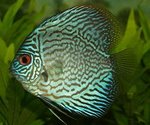
Creating the proper environment for discus fish involves a certain amount of work and documentation for achieving the best living conditions exotic fish needs. The first question you need to answer about your discus aquarium refers to the tank size. This very much depends on the room you’ve got at home and your financial availability. The discus aquarium should include a deep tank as these fish feel better in lots of water, not to mention that the more the water, the more stable the conditions. Hence, the discus aquarium should be at least 120 cm x 40 cm x 50 cm.
The position of the discus aquarium is very important precisely since the discus are very shy fish when they distrust the surroundings. Make sure the discus aquarium is far from any noise or direct heat and light sources. Heat in excess causes plant overgrowth, while also reducing the level of oxygen. The discus aquarium should also be positioned somewhere high as these fish are disturbed by movement, and it is not advisable to cause them undue stress. Then, the next big issue for a discus aquarium is the stratum you place on the bottom.
In case you create the discus aquarium for display purposes then fine gravel is great to place on the bottom of your tank, but if you use it only for breeding than leave the bottom uncovered. Thus, the discus aquarium is easier to clean as you need to disturb the fish as little as possible during the mating period. As for the plants for your discus aquarium, it is best to go for the natural ones, even if the plastic may look great. Presently you can even order the plant selection for your discus aquarium by mail and have it delivered at home.
Since many people are concerned about the aesthetic dimension of their discus aquarium you may choose rocks and driftwood as decorations. Such items are close to the discus fish native waters where they mainly serve as shelter. Be careful with the kind of rocks you use in your discus aquarium since they should not contain any metal ore or other contaminants. Rocks of the same color and texture are recommended though you may bring diversity to your discus aquarium. Similar texture prevents functionality problems particularly when the rocks have the same provenience, so, you may have to sacrifice some of the good looks for the health of your pets.
J M Nor
http://www.online-biz-guide.com









